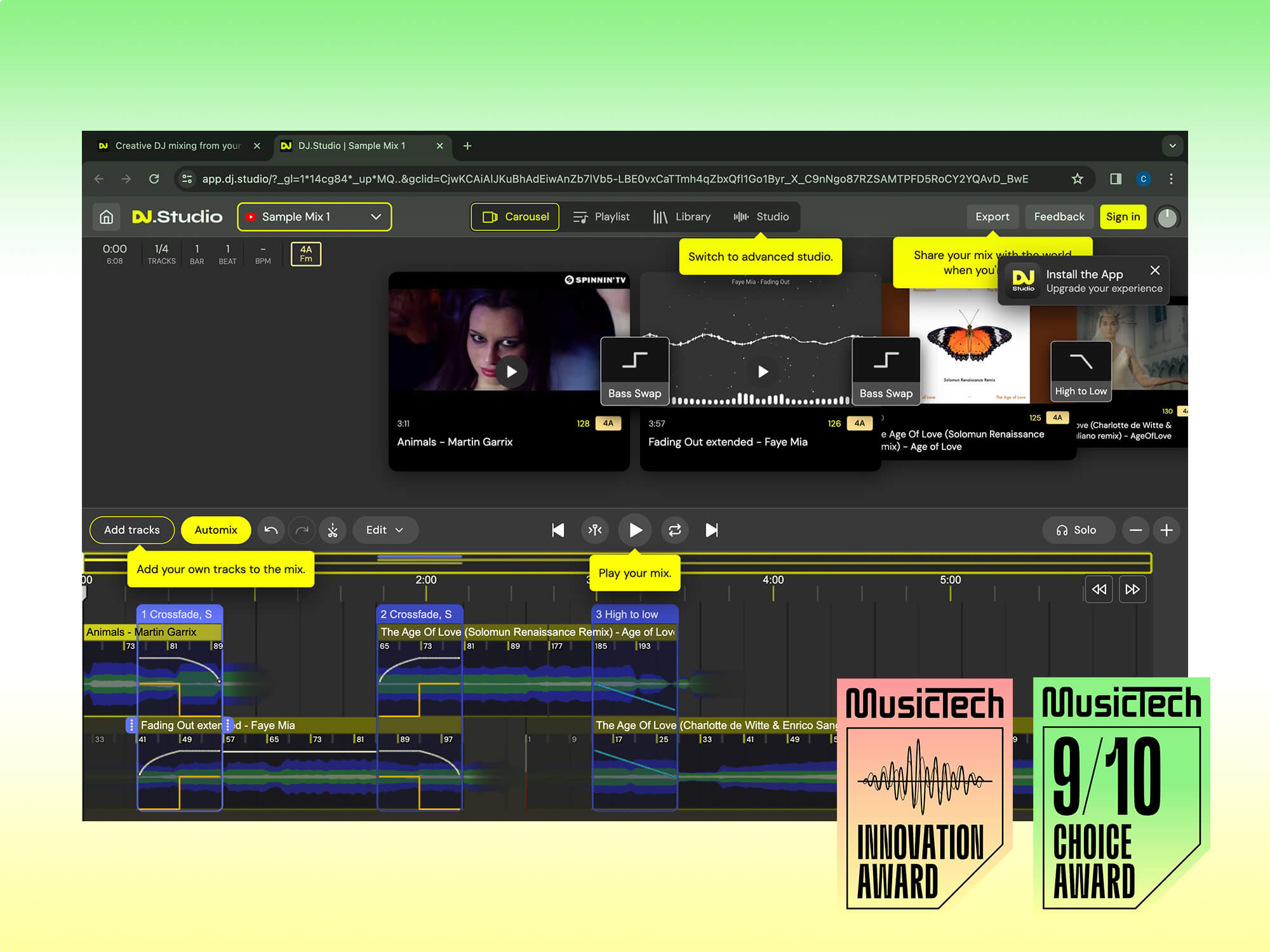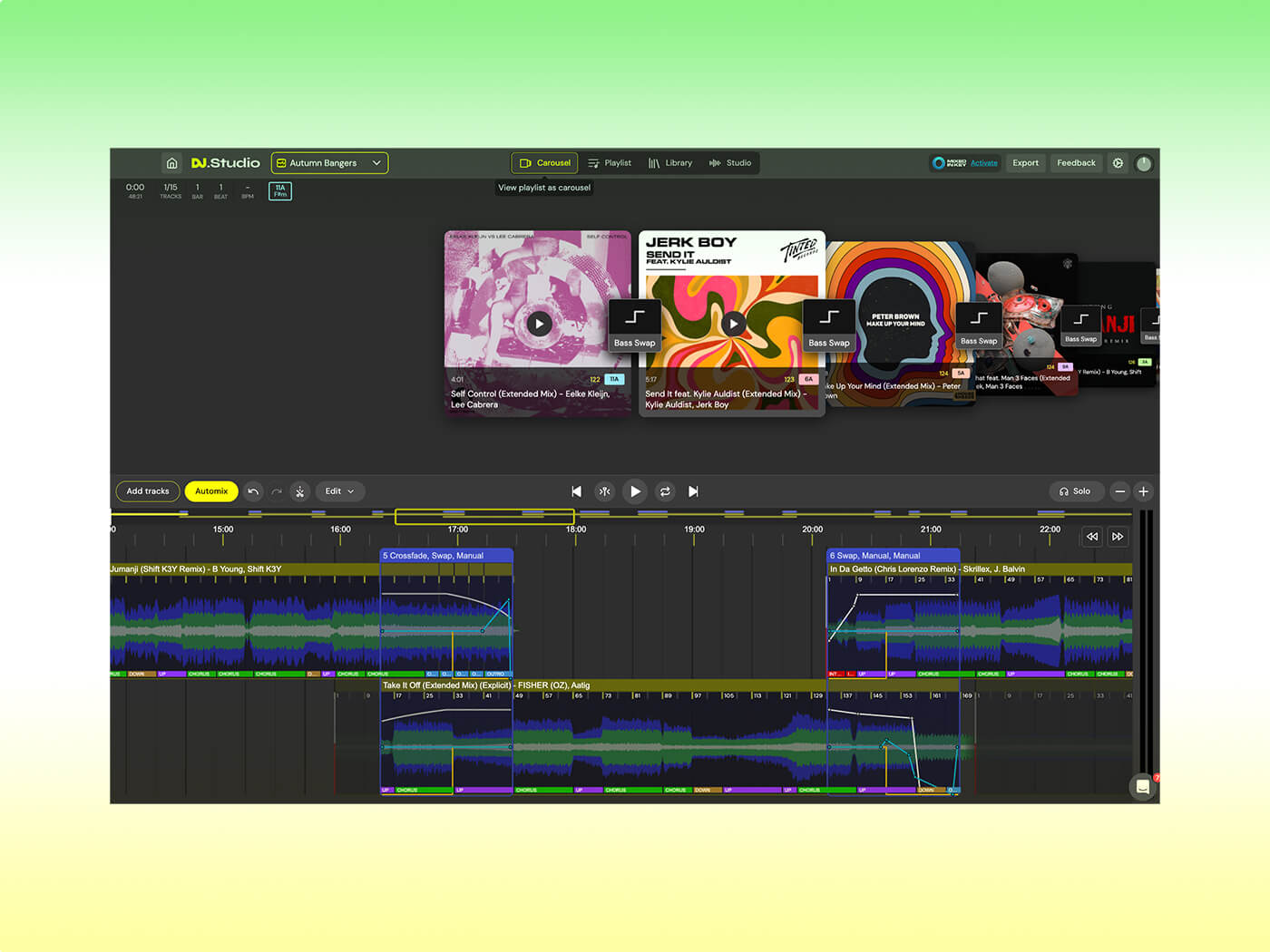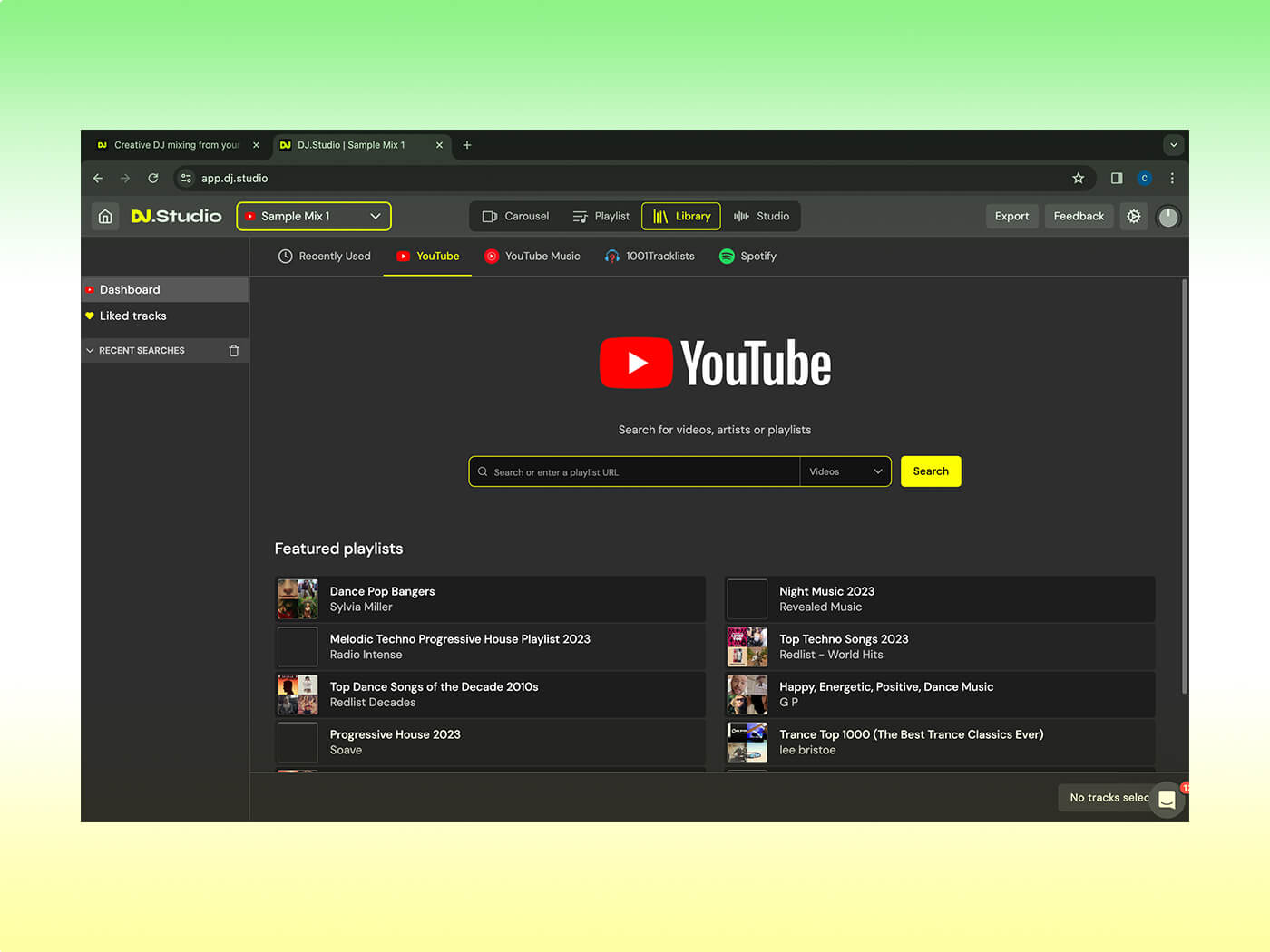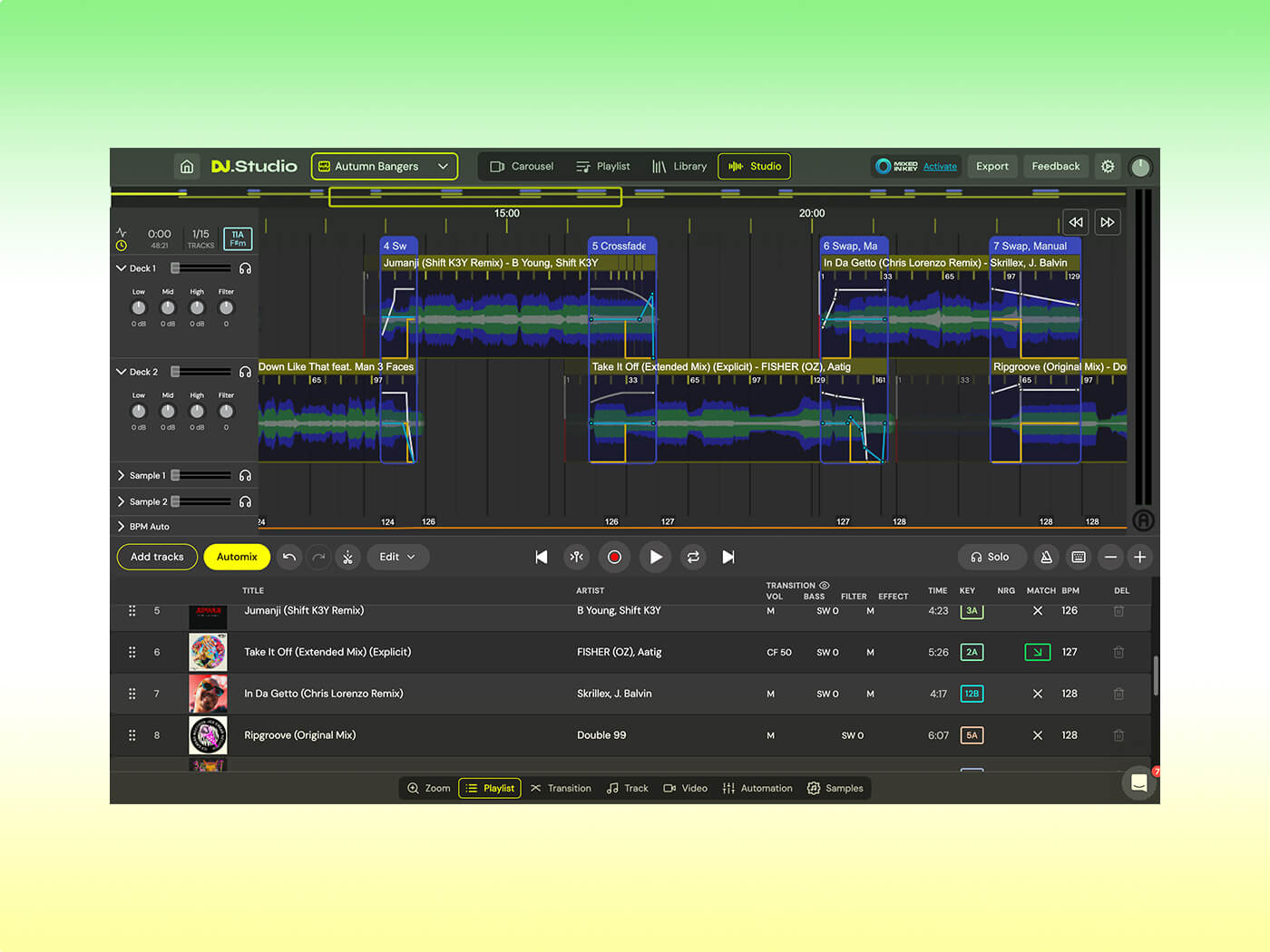Is DJ Studio the perfect DAW for DJs?
If you’ve been recording your DJ mixes in real time, struggling with your DAW to create offline mixes — or even just a playlist junkie wanting to craft killer mixtapes — DJ Studio is here to help.

DJ Studio. Image: MusicTech
Review Overview
Our rating
9
Our verdict
⊕ Tastemaking and playlist fans will love the YouTube features
⊕ Simple Ableton Live project export
⊕ Regular updates prompted by community feedback
⊖ Interface and workflow frustrations
⊖ Expensive as a monthly plan and a one-off cost
Lite: £199/$199 or £8/$8 per month, Pro: £499/$499 or £29/$29 per month, dj.studio
Recording a DJ mix is often as simple as performing and recording the master output in real-time, all in one take. It’s certainly a strong indicator of your DJing ability — but you’re limited if you want to get ultra-precise with your mix after it’s recorded, or pre-prepare something with voiceover for radio. You have very few streamlined choices.
There have been solutions over the years — Native Instruments’ Traktor DJ software initially launched as Traktor Studio, with the ability to record movements as automation, allowing you to fix any wonky mixes in post-production. Then there’s Ableton Live, which, although not specifically for DJ mixes, can be used to edit tracks, warp tempos and launch tracks live. But, historically, there was no standard DJ mix software. In fact, one of the most celebrated DJ mixes of all time, the Too Many DJs series by Soulwax, was actually “mixed” using a turntable, recording parts then editing together in Pro Tools — Pro Tools!
The forgotten hero was my particular favourite, MixMeister’s Fusion software. MixMeister allowed for ultra-simple, drag-and-drop, semi-automated, offline mix creation. But it was left stranded without many updates after its acquisition by InMusic in 2007 and struggled to keep apace with OS updates, especially on macOS.
These OS struggles with MixMeister studio, led me to search for an alternative. “There must be loads of different solutions by now, surely?” I thought… Well, surprisingly there wasn’t. It was this same scenario that led DJ Studio founder, Siebrand Dijkstra to create his app.

Branded as the first full DAW for DJs, DJ Studio has been created specifically to solve the hassle of creating DJ mixes, radio shows and the like. It’s designed to appeal to both the pro market and playlist addicts looking to explore curating mixes.
Thankfully, DJ Studio sports a familiar layout to other major DAWs. Available in the browser or as an app (although the browser features are limited), the AI-powered automixing will import your playlists from Rekordbox and other major music library apps. This includes the import of grid data, BPM and cue points into DJ studio, and you can toggle the settings on which of your music libraries and views you want to use.
Undeniably a killer, genuinely innovative feature is the ability to communicate with YouTube and create legal, full mixes using YouTube video search, then output these with video mix, using a visualization. This is a mind-blowing feature for both mixtape curators and users who may not have actually become DJs in the traditional sense yet. Plus, for DJs, it’s a useful tool to test out mixes, create YouTube content and send demos without having to invest in downloaded, offline files.
The app is constantly being updated. Feedback from the community seems to be implemented rapidly and new features and bug fixes are swift. When using Automix, the results are, as you might expect, hit and miss — but it’s really the ability to easily dig in and edit the Automix suggestions that makes DJ Studio so powerful. The matching for key or energy is particularly cool.

Our biggest gripe with DJ Studio is some of the interface quirks, especially with the recent addition of sample lanes, where the resizing and collapsing of tracks is clunky. Zooming out the entire interface from the view menu is a huge help here. There’s also a question over the pricing — it’s expensive as a one-off option and costly for somebody just doing the odd mix to be paying a monthly subscription. It’s worth watching out for sales and offers here.
Another issue lies in manually creating complex automation. There needs to be a dropdown menu or a way to more easily focus on the automation you want to adjust, as lots of automation lanes overlap and it’s easy to accidentally move the filter, for example, when you are trying to adjust the volume. A simple dropdown on the left Deck menu by the EQs, or a selection tool to bring automation into focus could solve this. It would be better if the rotary controls for EQ and filter were animated to match the automation lines as the volume fader does. Hopefully, this is in a future update.
Possibly the most noticeable difficulty with the app is the challenge with mixing genres other than dance music. DJ Studio admits it launched as an EDM-focused product and is now updating beat detection and algorithms to make improvements to other genres. Tracks without robust tempo grids can be more complicated. Automatic beat detection and mixing options are more challenging with disco, funk, hip-hop and similar non-four-to-the-floor electronic styles. But, even in recent updates, this is always improving, and when you dig in manually to mix transitions, there’s no limit to what you can do. Plus, if your grids and info are accurately set in Rekordbox, for example, it makes the process much smoother.
If you’re creative, it’s possible to adjust grids, create loops and samples and make mixes work in any way you want. This is helped further by a recently added feature of two Sample Lanes. This is basically two extra track lanes in the DAW that lets you resample parts from other tracks, or add loops and more audio. This works particularly well with cutting loops out of a track and using these to create new extended layers. This also expands DJ studio’s remit as a pure DJ mix tool and allows the possibility of creating quick edits and mashups too.

Taking creativity even further, DJ Studio has one more amazing trick up its sleeve. It allows for the export of the mix you are working on as an editable Ableton Live project, complete with tempo automation, any filtering, EQ and even volume fades! This means even if you hit the creative limits of the DJ Studio app, you can easily continue in Ableton to add more tracks, record voice-overs, add extra effects or create more complicated edits.
This is still a young product that is constantly evolving and driven by passionate, skilful people. I’m confident that this will evolve into an industry-standard tool for DJs and radio show hosts and will become an entry point for music obsessives wanting to explore making their own mixes.
There’s long been a gap in the market for a product like DJ Studio and it’s by far the best software for creating DJ mixes that I’ve ever used.
Key Features
- Integration with existing popular music libraries, grids, cues and more.
- Ability to create mixes using YouTube
- Export as an Ableton project
- Integration with Beatport
- Integration with Mixed In Key